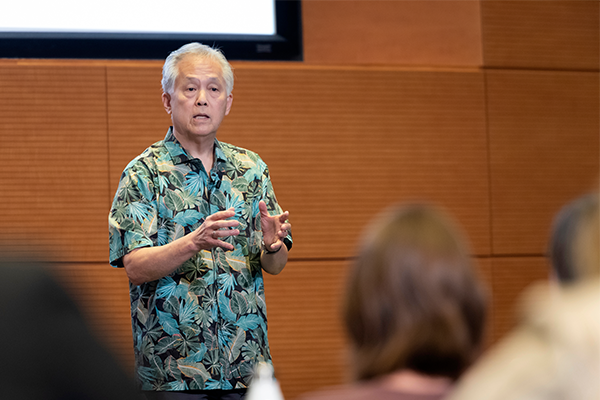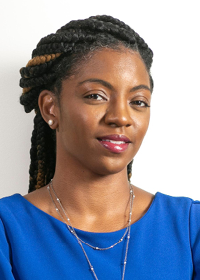
Creating programs to improve diversity in educational programs in science, technology, engineering, and math (STEM) can at times be like pushing a boulder up a mountain only to have it roll back down, forcing leaders to start over from scratch. But the way to achieve lasting change lies in putting fewer resources into fixing students and instead focusing on changing systems. That’s according to David Asai, PhD, keynote speaker at Duke University School of Medicine’s inaugural Equity Advancement Symposium.
“All of those programs have helped the students, but what happens when the money runs out? We go back to where we were before,” said Asai, who is the senior director for science education at Howard Hughes Medical Institute. “This isn’t sufficient. We need to create programs that are not about overcoming barriers but destroying them.”
Held on July 27, the 2023 Equity Advancement Symposium, “Sustaining the Momentum: Leveraging Equity, Diversity, and Inclusion Beyond the Pandemic,” was sponsored by the School of Medicine IDEALS Office and the Office of Equity, Diversity and Inclusion. The daylong event brought together more than 100 faculty, students, and staff from across Duke for conversations on the intersection of science and equity, diversity, and inclusion.
Johnna Frierson, PhD, associate dean of equity, diversity, and inclusion for the basic sciences, said the symposium addressed an important need. “The eagerness and urgency to address racism and systemic inequality sharply increased in 2020 in the wake of the COVID-19 pandemic and a wave of civil protest calling for justice,” she said.
“We wanted to provide an opportunity for members of the School of Medicine and campus community to convene and consider what's next in our efforts for inclusive excellence while highlighting the strengths we have already cultivated. Education, visibility, and open conversation are all critical to this ongoing effort as we continue to improve inclusion and access to resources and opportunity for everyone."

The lack of diversity in STEM is something medical schools need to address, Asai said during his keynote address. Reiterating points he made in a 2020 paper in Cell called “Race Matters,” he commented on how despite increased interest in STEM among students from underrepresented groups, disparity in the percentage of those who graduate with STEM degrees remains.
He said the key to addressing the disparity is to focus less on student-centered activities where students are asked to assimilate, and instead focus on changing the culture of STEM. Asai encouraged schools to take an equity-centered approach rather than a diversity-centered approach, which he said often doesn’t stick.
“If the person doesn’t feel they belong, why should they come to this organization, and why should they stay?” he said.
Using the analogy of a mechanical rachet, which can move only in one direction, Asai encouraged schools to focus on making sustainable changes in areas such as the curriculum. For example, taking an approach that asks students what they think rather than what they can memorize could create a more inclusive environment.
Also, Asai said educators and administrators should look at how they reward behaviors, such as rewarding faculty not only for the number of papers they publish but also for how inclusive their teaching is and how well they mentor students.
Dalal Azzam, a second-year PhD student in biochemistry, said the symposium showed that there is a community of people who share the same goals of advancing equity, diversity, and inclusion at Duke and increasing diversity in STEM.
“Science is highly interdisciplinary and collaborative,” Azzam said. “We do this work to improve people’s lives. It’s helpful to have different perspectives so you can better cater your treatments and cures to people from different populations, and no one is excluded from benefiting from our work.”
In addition to the keynote address, the symposium also included poster presentations and a three-minute thesis competition where nine PhD students were given three minutes to present their research. Winners of both the poster presentation and thesis competitions were announced at the end of the day.
Theater Delta, an interactive theater for social change, led symposium attendees through a dialogue on equity. Actors from the theater performed two scenes, and then the audience had the opportunity to ask the actors questions and explore issues about belonging and workplace culture.
Nichole Orench-Rivera, PhD, was the BioCoRE Alumni Speaker. Orench-Rivera, who was a member of the second cohort of the BioCoRE program, shared lessons she learned as a graduate student at Duke, offering current students advice on navigating their way through graduate school. BioCoRE, which is open to graduate students, is a program committed to increasing diversity within Duke’s biosciences community.
The day wrapped up with an awards ceremony and reception for the Michelle Winn Inclusive Excellence Awards. Because ceremonies were halted for the past three years during the pandemic, recipients from 2020 through 2023 were honored. New BioCoRE and PRIME-PREP scholars for the 2023-2024 academic year were also introduced and recognized at the ceremony.
Photos by Les Todd
Photo caption: David Asai, PhD